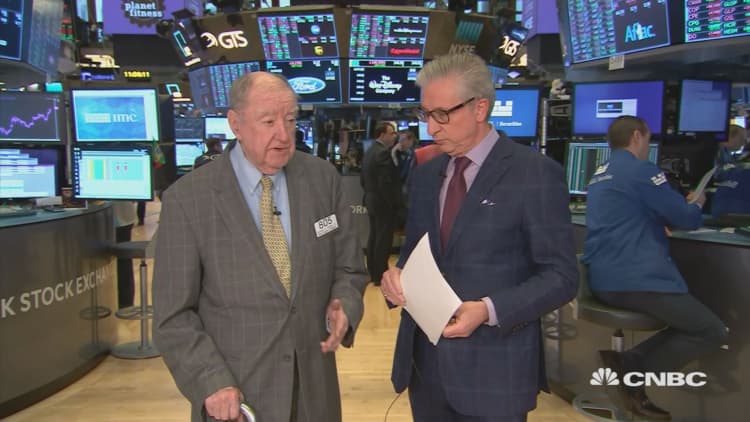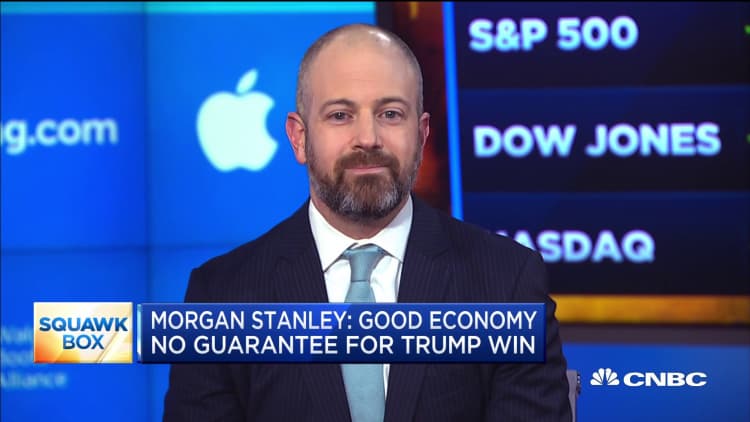
Stocks wavered on Tuesday as Wall Street assessed the growing geopolitical risks stemming from U.S.-Iran tensions along with better-than-expected data on the economy.
The Dow Jones Industrial Average closed 119.70 points lower, or 0.4% at 28,583.68. The S&P 500 pulled back 0.3% to 3,237.18. The Nasdaq Composite ended the day just below the flatline at 9,068.58.
The major averages briefly pared earlier losses after the Institute for Supply Management said its non-manufacturing index rose to 55 in December from 53.9 in November. That print is also above economist expectations.
President Donald Trump announced last week that the U.S. had killed Iran's top military commander in Baghdad, Gen. Qasem Soleimani. The president also said Sunday that he could slap sanctions on Iraq, after its parliament passed a resolution calling for the government to expel foreign troops from the country.
However, U.S. equities rose on Monday, reversing earlier losses and recovering some of Friday's steep decline. Market players are now waiting to see if the situation will escalate with a potential retaliation from Iranian forces.
"The headlines seem to be moving more than the market right now," said Keith Lerner, chief market strategist at SunTrust Private Wealth. "I think investors have been through this a few times now." He also noted the market is in a "consolidation mode" after notching sharp gains in 2019.
The S&P 500 and Nasdaq logged their best annual performance in six years in 2019, surging 28.9% and 35.2%, respectively. The Dow also climbed more than 22% in 2019.
To be sure, the rise in U.S.-Iran tensions sparked bids in safe havens such as gold and Treasurys. Gold futures hit their highest level in nearly seven years on Monday. They hovered around those levels on Tuesday.
"Investors aren't oblivious to rising Middle Eastern tensions, but they're placing Soleimani in the same category as the recent Iranian strikes against Saudi oil assets (a risk, but not immediately fatal to the present equity narrative)," said Adam Crisafulli, founder of Vital Knowledge, in a note.
The benchmark 10-year Treasury yield has fallen to around 1.8% after starting the year above 1.9%. The 2-year rate has also fallen to 1.54% from about 1.58%.

Crude prices initially rose after last week's attack amid concerns over possible disruptions to the global oil supply. However, they fell 1% on Monday.
Dryden Pence, chief investment officer at Pence Wealth Management, said the market is not too worried about the conflict's impact on oil given how much U.S. production has risen in recent years.
"We are the biggest oil producer in the world and we're able to make up what's lost from Iran," Pence said. "If you took Iran completely out of the oil market, that's not a big deal."
"That's why the market reaction has been so muted compared to what it would've been 10 years ago," he added.
Micron jumped more than 8% while Western Digital surged 6.8% after an analyst at Cowen upgraded the stocks to outperform from market perform, citing a potential recovery in the memory chip market.
Bank of America and J.P. Morgan Chase were downgraded by a UBS analyst, sending their shares down 0.7% and 1.7%, respectively. The analyst said investors should wait for a better entry point on Bank of America. As for J.P. Morgan, the analyst noted "the bar has been raised for further outperformance."
—CNBC's Michael Bloom and Silvia Amaro contributed to this report.


